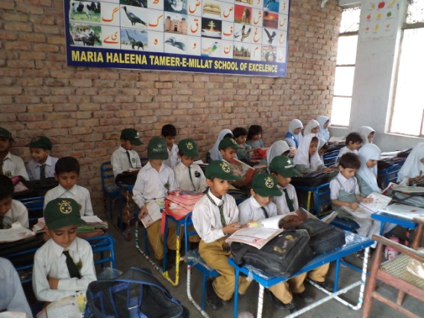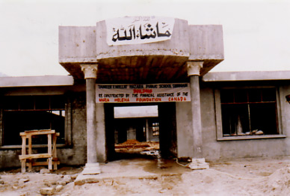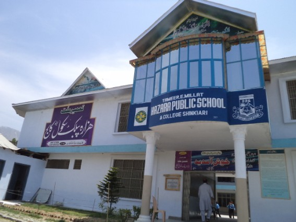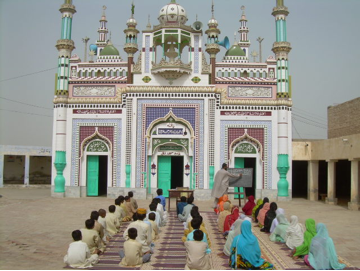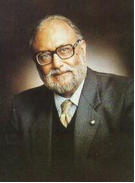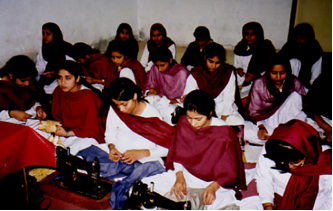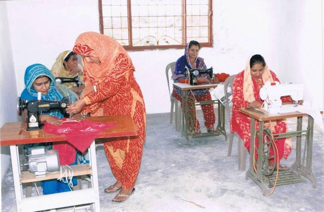We do not have our own office in Pakistan; all our projects are carried out in partnerships with Pakistani non-governmental organizations (NGOs)
Projects
Health
Amina Jabbar Trust (Waqf) Hospital/Clinic (1998). This medical facility, the first project of the Foundation, is in Saddar area of Lahore. It is housed in a detached single-family bungalow donated by Mrs. Amina Jabbar, sister of Dr. Iqbal. The Foundation gave $20,000 to renovate the house and convert it into an out-patient hospital/clinic. A Pakistani non-governmental organization (NGO) called Al-Khidmat Foundation (AKF) is running the clinic on a self-sustaining basis; helped by donations collected locally. About 80 poor patients come every day; they pay one-quarter the fees charged by private practitioners. They see a physician and, if needed, receive medication for three days. Two physicians, a dentist and a pediatrician serve in this facility. A local philanthropist has donated an ambulance to take emergency patients to a bigger hospital in the city.
Annual Medical Examination of Primary School Children:
In several villages of Bahawalnagar we have a non-formal primary education programme described below. Through a small hospital there in Bahawalpur we arrange annual medical/physical examination of 1,000 children at $1 per student.
Education
A. Permanent Primary Schools
Typically, the local community provides the land. We pay for construction of the school building, as well as for furniture and equipment. This costs us, (in 2012) a total of somewhere between $60,000 and $70,000. Our Pakistani partners manage the schools, charging low fees and covering the operating losses by donations collected locally. In these schools, which are self-sustaining after building has been completed, tuition fees are generally about $5 per month, and teachers’ salaries are between $40 and $60 a month. All schools are co-educational, follow the government’s prescribed curriculum and are non-sectarian. The teachers are almost exclusively women. We have helped establish eleven such primary schools, and helped reconstruct one demolished school in the 2005 earthquake-affected area, and one school which was washed away during the 2010 floods. Our fourteenth school is under construction.
In Pakistan, the primary school is from Grade 1 to Grade 5, and high school is from Grade 6 to Grade 10. In some provinces of the country, students have to take Provincial Board Examinations at the end of Grade 5, Grade 8, and Grade 10. The certificate at the end of Grade 10 is called Matric.
Below we list the first few Permanent Primary Schools. For a complete list visit our latest Newsletter.
Fazal Noor Primary School (2000). This is our first primary school established in memory of the Founder’s mother, Fazal Noor. We partnered with Al-Khidmat Foundation (AKF) to establish this institution. The school is situated in Kot Lakhpat, a poor area of Lahore.
Some of our older schools, first established as primary schools have been upgraded to high schools for girls, so has this school.
Haji Bostan Primary School (2001). Our second school, named after the Founder’s father is situated in a very congested slum area called Ghaziabad, on the very east of Lahore. We gave $30,000 to establish this school. It is built on the first floor of an existing small building, has very little floor area. The school is managed by Anjuman Fallah-e-Shaban-ul-Muslimeen (AFSM).
This school has now been upgraded to Middle School for Girls.
Dadi Helena Primary School, Dina Nath (2004). This, our third primary school is named after the paternal grandmother of the Founder’s wife. (in Urdu, dadi means mother of father) It is situated in Dina Nath village about 60 km south of Lahore. This large school, costing us about $50,000 is established in partnership with CARE Foundation, Pakistan. The school has now been upgraded to high school level.
All primary schools established after Dadi Helena Primary School are named after the Foundation, Maria-Helena. We ran out of family members’ names!
Maria-Helena Primary School, Dharyala Jalip (2006). This is our fourth school, but first primary school with our new partner Tameer-e-Millat Foundation (TMF) (www.educatepakistan.com). TMF had a high school for girls in an old building, and a primary school in rented space that it had to abandon in the town cemtre. MHF provided funds for construction of a primary school on a vacant piece of land adjoining its high school for girls.
Since 2005, in partnership with Tameer-e-Millat Foundation, we have sponsored several Permanent schools mostly in district Jhelum, and elsewhere; please visit our latest Newsletter.
Hazara TM Public School, Shinkiari (2007). This large school was badly damaged during the 2005 earthquake in Pakistan. The original school was based on three separate buildings. After the earthquake of 2005 in Pakistan, our President went to Pakistan in November 2005 and Dr. Bernard Mohan from the Board of Directors went in September 2006. They met with our partners working in the earthquake-affected areas, and also visited our other schools. We offered $125,000 to rebuild the primary section on the ground floor of a single two-storey building. Other donors came forward to construct the upper floor to house the high school section of the school.
After 2007 we have helped build several schools in Pakistan, see the latest Newsletter. However, before we leave this section of Permanent Primary Schools we would like to mention a school we recently sponsored after the epic floods of 2010.
Talis Primary School Skardu (2011). During the 2010 floods a small primary school in the very north of Pakistan was completely washed away. We offered $35,000 to build a new school on a new site in the same village Talis, on a plot of land donated by a local notable. This school is the result of a special fundraising appeal by our president Dr. Muhammad Iqbal, see the section Founder’s Bio for details.
B. One-room One-teacher Home Schools (2000 to present)
The infrastructure costs to build regular multi-classroom schools are considered very high in terms of the local economy. As a result, Pakistan has copied the example of Bangladesh in providing primary education in one-room one-teacher schools, called home-schools, meant for the poorest children and for working children. Classes are held at the teacher’s home or in a community building. Students do not pay any fees. In our schools we provide them with books, notebooks, and mats to sit on, and also pay the teacher’s salary. Currently, the cost of supporting one such school of 25 to 35 students is about $1,200 per year. In the Pakistani school system, the primary school academic program is five years. In the home-school system, due to fewer holidays, the same curriculum is covered in 36-40 months. This is the most cost effective way of promoting literacy.
Another characteristic of these schools is that students sit on mats spread on floor; no chairs and desks are provided. This is to accommodate 25 to 35 students in one small room.
Starting with 2000, we have worked with four different Pakistani NGOs to promote primary education in one-room one-teacher home schools. There are two methods of schooling within this system: first, by teaching multi-grade classes in the same room, and second, by admitting all students in Grade 1, and keeping the same students through the three-year academic cycle. Our experience shows that the latter system works more efficiently.
At present we are sponsoring 15 schools operating under the latter method. Most of these schools are either in Mosques or rooms attached to Mosques in a rural area of Bahawalnagar. Most of the children are from landless peasant families. Our current partner is Kawish Welfare Trust (www.kawish-welfare-trust.org)
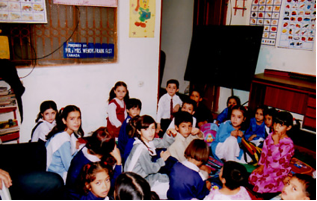
A One-room One teacher Home School managed by Tameer-e-Millat Foundation (TMF), in a rented living room of a family in Rawalpindi. Note: The students are all dressed up knowing that a foreign visitor is coming to take photos!
C. Scholarships
We have various levels of scholarships, mostly to attract more girls to schools and to keep them longer in the school. All scholarships are in schools run by our Pakistani partner Tamee-e-Millat Foundation.
- 150 Scholarships, of $2 per month, for primary school students in 10 different schools. These scholarships cover essentially half of the tuition fee.
- 20 Scholarships, of $5 per month for high school girl students in one school in Dharyala Jalip, Jhelum.
- 8 Professor Abdus Salam Science Scholarships for girls, of $15 per month value for high school girl students in science in four different schools. These science scholarships, starting in April 2013 are to honour Professor Abdus Salam, Pakistan’s only Nobel Laureate who died in 1996.
D. Libraries
During 2009 and 2010 we sponsored two libraries in two primary schools of The Citizens Foundation (TCF) Pakistan, www.the citizensfoundation.org
E. Skills Training
Nani Maria Vocational School (2000). This, essentially a needlecraft school is named after the maternal grandmother of the Founder’s wife. (In Urdu, “nani” means mother of mother) We offered $15,000 to Al-Khidmat Foundation to build this two-room vocational training centre for young girls and women to learn sewing and local needlecraft. The course is 6 to 12 months and the girls learn enough to subsequently make a small income. Some also make their bridal dresses there. This training also helps the invisible domestic economy, and skills learnt in such a school add ‘value’ to a girl in the marriage market. The expenses of running this school are covered by fees and donations.
This school is built next door to Fazal Noor Primary School described above.
Dr. Marilyn Mohan Vocational School (2004). For quite some time we had been searching for NGOs run by women. During our internet search we came across one called AMEN, All Mothers Educated Now. This organization of Christian women had contacts with the local churches and asked us to help it establish a vocational school for women in one of the churches. Professor Emeritus Bernard Mohan, and one of our Board members, offered to fund the vocational school in memory of his wife Dr. Marilyn Mohan. This vocational school started out in one of the rooms of a Pentecostal church, but due to some changes in the management the school has been moved to one of our new schools in Pind Dadan Khan, Jhelum.
Promoting Bicycle Riding for Girls: In Pakistan, in rural poor areas, female literacy is very low with the consequence that there is a shortage of qualified female teachers with post secondary education. However, such teachers are generally available in towns that may not be too far from villages. In a number of villages where we have primary schools, the teachers come from towns nearby. They take crowded public transport buses. Therefore, we are trying to promote bicycle riding for young adults and women as a programme to change public attitudes in that very conservative male dominated society. If women were encouraged to ride bicycles, they would be less dependent on public transport.
We are searching progressive Pakistanis to help us in promoting bicycle riding for girls in Pakistan. If you feel you can change the world please call us!
Maria-Helena Bursar Fund, University of British Columbia (2000)
In order to honour wishes of the members of our Board who have close ties to UBC, we have established a small bursary fund at the university. The bursaries are awarded from the income generated from the capital of this fund. The university selects the recipients.








